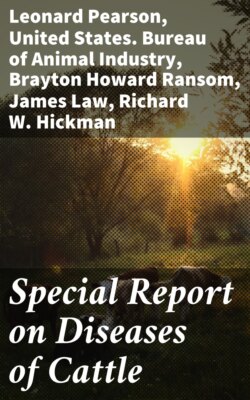Читать книгу Special Report on Diseases of Cattle - Lowe - Страница 14
На сайте Литреса книга снята с продажи.
SALIVATION.
ОглавлениеSalivation is a symptom of some general or local disorder. It may be a symptom of a general disease, such as rabies or foot-and-mouth disease, or it may be a purely local trouble, as when copious secretion of the salivary glands is produced by the eating of irritating plants, such as wild mustard. When saliva is observed to dribble from the mouth, that part should be carefully examined by introducing into the mouth an instrument like a balling iron, or, if one is not at hand, by grasping the tongue and partially withdrawing it from the mouth, and by placing a block of wood between the back teeth, while all parts of the mouth are exposed to a good light, so that the presence of any foreign substance may be detected. The cause is sometimes found to be a short piece of wood becoming fixed on the palate, its two ends resting on the upper molar teeth of each side; or it may be a needle, thorn, or splinter of wood embedded in the tongue. Sometimes a sharp piece of tin or other metal may become partially embedded in the inner surface of the cheek. Hay occasionally possesses some quality, usually dependent upon its having heated in the mow or having become moldy, which produces salivation. Second-crop clover and some irritant weeds in the pasture or forage may cause salivation. Cattle rubbed with mercurial ointment may swallow enough mercury in licking themselves to bring about the same result. (See "Mercury poisoning," p. 57.) Such cases, of course, arise from the constitutional action of mercury, and, on account of the common habit which the animals have of licking themselves, indicate the danger of using such preparation externally. Mercury is also readily absorbed through the skin, and as cattle are very susceptible to its action it is thus easy for them to be poisoned by it even without licking it from the surface. Cases of mercurial poisoning sometimes follow disinfection of cattle stables with the usual 1 to 1,000 solution of mercuric chlorid.
Treatment.—If salivation depends on the irritation and inflammation set up by the ingestion of acrid plants, or forage possessing some peculiar stimulating property, the feed must be changed, and a lotion composed of an ounce of powdered alum dissolved in a quart of water may be syringed into the mouth twice a day, using half a pint of the solution each time. If, however, the salivation is due to the presence of a thorn, splinter of wood, or any other foreign substance embedded in the cheek or tongue, the offending object should be removed and the mouth washed occasionally with a weak solution (2 per cent) of carbolic acid and tepid water. When salivation is produced by mercurial poisoning or by foot-and-mouth disease, the treatment appropriate to those general conditions of the system, as well as the local treatment should be applied. (For information about foot-and-mouth disease see p. 383.)
